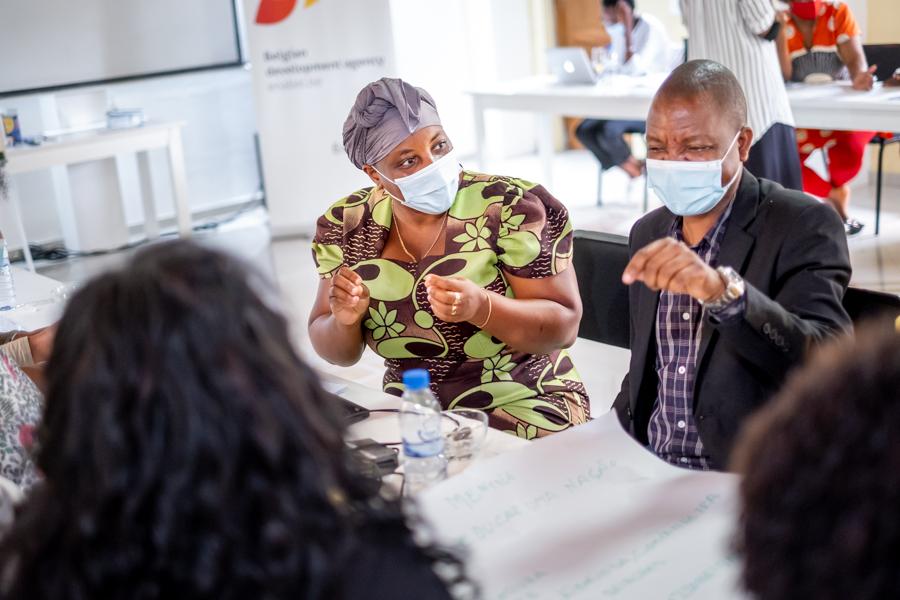Support to gender mainstreaming in the promotion of sustainable access to energy in Mozambique: a training-of-trainers approach
By Esra NURJA and Evert WAETERLOOS, Enabel Mozambique
As part of Enabel’s support to
the Mozambican Ministry of Mineral Resources and Energy (MIREME) and the Energy
Regulatory Authority (ARENE), a study was commissioned to identify strategic entry points for gender mainstreaming in the
promotion of sustainable access to energy for all in Mozambique. The study by
GreenLight Africa was completed in March 2021, and identified many gaps in
technical capacity and available resources within MIREME. The Gender Focal
Points (GFP), for instance, do not feel equipped with the proper tools to
undertake gender mainstreaming activities. Therefore, the study emphasizes the
need to strengthen the capacities of the GFP of MIREME and ARENE at central and
provincial level by elaborating a training-of-trainers’ manual on gender
mainstreaming in the energy sector.
In response to GreenLight Africa’s
study and MIREME’s request to improve the dissemination of information and
training material within the Ministry, a training-of-trainers’ (ToT) manual on
gender integration within the energy sector has been developed. The manual
provides technical content on the relation between gender and energy, with a
pedagogical support to guide trainers through the content. The aim of this
manual is to adapt and apply the ToT approach, which has proven to be efficient
in disseminating information and strengthening peer-to-peer learning, in the Mozambican
context.
The manual resulted from the
collaboration with two consultants: Gilda Monjane (entrepreneur and specialist in
gender and renewable energy in Mozambique) and GreenLight Africa (research and
development organization focusing on the energy and environment sectors). The
GFP were involved throughout the entire process, from content identification to
review of the manual. Visits to relevant districts were organized during the
development of the manual to get familiar with the challenges that rural
families face because of limited or no access to energy. The focus was on how
the use of renewable energies can contribute to resolving these challenges,
especially for women and girls, who are mainly affected by energy poverty, as
they are in charge of household activities.
As part of the manual
development, a five day-training was given by GreenLight Africa to introduce
the manual to the GFP at central and provincial level, as well as experts in
renewable energies from ARENE, FUNAE and EDM. As most of them received previous
training on gender and/or energy, the initial goal of this training was to train
the participants in becoming trainers through a ToT approach. However,
difficulties in using this approach arose during the training, when gaps in the
participants’ knowledge on the topics covered came out. There was, for
instance, still a lot of confusion between the concepts of “gender” and “sex”.
For this reason, the training was
readjusted to focus more on the content of the manual, in order to ensure a
proper use of the manual by the GFP afterwards. The manual consists of 6
modules: orientations for the trainer; gender concepts; gender mainstreaming
approaches in the energy sector; gender mainstreaming in key energy sector
documents; renewable energies; and the role of GFP. Active learning techniques,
referring to practical exercises, such as role playing, plenary discussions,
group works, brainstorming sessions, etc. were used throughout the whole training with
the aim of familiarizing participants with this “teaching and learning” approach.
Now that the participants have a
better understanding of the content, the next step will be to focus on the
pedagogical aspects of the manual. This will require a further monitoring of
how they use the manual in their own work environment, and how they continue to
broaden and deepen their knowledge. The objective of this support is to equip
and prepare the GFP to become trainers and advocates of gender mainstreaming in
the energy sector of Mozambique, both in their professional and personal environment.
Picture: Regina Ernesto (GFP of
Province Cabo Delgado) and Julio Balate (PFG of EDM). November 2021. Photo credits: Isabel Corthier
Laatste nieuws van dit project
Geen nieuws

